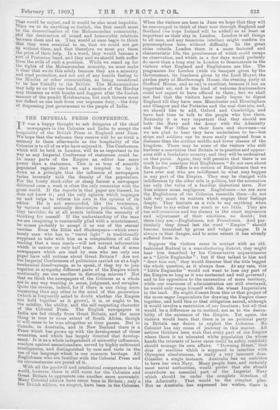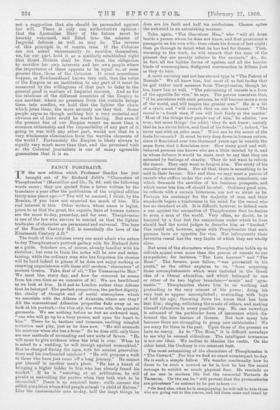THE IMPERIAL PRESS CONFERENCE.
pwas a happy thought to ask delegates of the chief newspapers in the Colonies and India to accept the hospitality of the British Press in England next June. We hope that the welcome they receive will be as vivid a Memory to them afterwards as the hospitality of the Colonies is to all of us who have enjoyed it. The Conference, :which will be held. in London, will be as important in its way as any Imperial Conference of statesmen could be. In many parts of the Empire an editor has more power than a statesman. This is so true of scantily populated regions that we are tempted to lay it down as a principle that the influence of newspapers varies inversely with the density of the population. For the lonely stock-rider or sheep farmer a newspaper delivered Once a week is often the only connexion with the great world. If the reports in that paper are biassed, he does not know it; and the only opinion which impinges on and helps to inform his own is the opinion of its editor. He is not surrounded, like the townsman, by various and mutually destructive policies, which, if they bewilder, do at all events indicate the necessity of • thinkiug for oneself. If the understanding of the man we are imagining is continually plied with a misstatement, be comes probably to accept it as one of the eternal verities. Even the Bible and Shakespeare—which every lonely man who has to "travel light" is traditionally eupposed to take with him as a compendium of all the reading that a man needs—will not correct information which is 'untrue or only half true. And What if some newspapers which are read by men who see only one Paper have odd notions about Great Britain? Are not the Imperial Conferences of politicians carried on at a high mechanical disadvantage, so to speak, if they try to join . together in sympathy different parts of the Empire which continually see one another in distorting mirrors ? Not that we think the newspapers of the Colonies as a whole are in any way wanting in sense, judgment, and scruples. Quite the reverse, indeed, for if there is one thing more reassuring than any other to the mind of this generation (which is frequently asked to doubt whether the Empire can hold together as it grows), it is, or ought to be, the solidity, the ability, and the self-respecting character of the Colonial Press. The English newspapers in 'India are fed chiefly from Great Britain, and the same thing is true to some extent of South Africa, though it will cease to be true altogether as time passes. But in Canada, in Australia, and in New Zealand there is a Press which has grown up with the development of those countries, and which has largely directed that develop- ment.. It is as a whole independent of unworthy influences, resolute against sensationalism, served by highly cultivated intelligences, and distinguished by care and taste in the use of the language which is our common heritage. All .Englishmen who are familiar with the Colonial Press and its circumstances are proud of it.
With all the goodwill and intellectual competence in the world, however, there is still room for the Colonies and Great Britain to appreciate one another more accurately. Many Colonial editors have never been in Britain ; only a few British editors, we suspect, have been in the Colonies. When the visitors are here in June we hope that they will be encouraged to think of their tour through England and Scotland (we hope Ireland will be added) as at least a& important as their stay in London. Loudon is all things to all men, and any tenacious intellect might confirm its preconceptions here without difficulty. In the great cities outside London there is a more featured and characteristic life, the genuineness of which could escape no observation, and which in a few days would probably do more than a long stay in London to demonstrate to the visitors what England and Englishmen are like. The programme for Loudon (with its banquet given by the Government, its luncheon given by the Lord Mayor, the garden party at Marlborough House, the evening party at Stafford House, and so on) is excellent, because it has an important air, and is the kind of welcome Ambassadors could not expect to have offered to them ; but we shall not feel that the visitors have really begun to digest England till they have seen Manchester and Birmingham and Glasgow and the Potteries and the coal districts, and, we should like to add, Oxford and Cambridge, and have had time to talk to the people who live there. Naturally it is very important that they should see both the Navy and the Army with the Admiralty and the War Office as their hosts and showmen—as we are glad to hear they have undertaken to be—but ships and soldiers can be more easily imagined from a distance than the civilian middle and lower classes of the kingdom. There may be some of the visitors who still harbour a conviction that Britain is in practice and appear- ance still a feudalistic country, and they will be undeceived on that point. Again, they will perceive that there is no truth in the assertion that Englishmen "do not care about the Empire." There is no section of Englishmen that we have ever met who are indifferent to what may happen in any part of the Empire. They may be charged with indifference by the other. side in politics, but the accusation has only the value of a familiar dialectical term. Nor does silence mean negligence. Englishmen—we are sure the Englishmen of the Colonies resemble them—do not talk very much on matters which engage their feelings deeply. They hesitate as a rule to say anything when they fear to say either too much or too little. They are , too self-conscious and too clumsy. in the exact expression and. adjustment of their emotions, no doubt; but there they are,—Englishmen, not Frenchmen. And par- ticularly they dread lest the word " Empire " should become tarnished by gross and vulgar usages. It is always in that danger, and to some extent it has already suffered from it.
Suppose the visitors came in contact with an old- fashioned Radical in a manufacturing district, they might hear him described by his Conservative acquaintances as a "Little Englander . ; but if they talked to him and "drew him out," they would discover that the title begged the whole question, as it always does. At any rate, this "Little Englander" would not want to lose any part of the Empire so long as it was contented and well governed ; and in his opposition to the annexation of more territory, while our resources of administration are still overtaxed, he would only range himself with the wisest Imperialists in the land. He might dissent from this or that project of the more eager Imperialists for drawing the Empire closer together, and hold this or that obligation sacred, although it would involve a, restriction of our frontiers ; but, all that would be a difference as to method, not as to the desira- bility of the existeuce of the Empire. Yet again, the visitors would learn that there is iu no political party in Britain any desire to exploit the Colonies. No Colonist has any cause of jealousy in this matter. All serious thinkers here wish that every part of the Empire where there is an educated white population (to whose hands the interests of lower races could be safely confided) should manage its own affairs. "Downing Street," that deus ex machina which is supposed to interfere with Olympian absoluteness, is really a very innocent dens. Consider a single instance. Australia has an ambition to have her own Navy. Many people here, and certainly most naval authorities, would prefer that she should contribute an essential part of the Imperial Navy which should be under the complete direction ef the Admiralty. That would be the simplest plan. But as Australia has expressed her wishes, there is
not a suggestion that she should be persuaded against,
her will. There is only one authoritative opinion : that the Australian Navy of the future must be heartily welcomed, and fitted into the scheme of Imperial defence as well as may be. The reverse of this principle is, of course, true. If the Colonies are not asked unnecessarily to sacrifice themselves, we, for our part, hold it as a similarly established right that Greet Britain shall be free from the obligation to sacrifice her own interests and her own people where The importance of these appears to be equal to, or even greater than, those of the Colonies. It must sometimes happen, as Newfoundland knows very well, that the value of the Empire as an institution to any part of it must be measured by the willingness of that part to defer to the general good in matters of Imperial concern. And as for the relations of the different countries of the Empire to one another, where no pressure from the outside brings them iuto conflict, we hold that the lighter the chain which joins them, the more securely are they tied. Some people argue as though nothing but a very material and obvious set of links could be worth having. But even if the present ties of our Empire meant no more than a common citizenship and the impossibility of any part of it going to war with any other part, would not that be a very wholesome elimination from the warlike elements of the world Fortunately the Empire is likely always to signify very much more than that, and the promised visit oe the Colonial journalists is one of many agreeable guarantees that it is so.







































 Previous page
Previous page